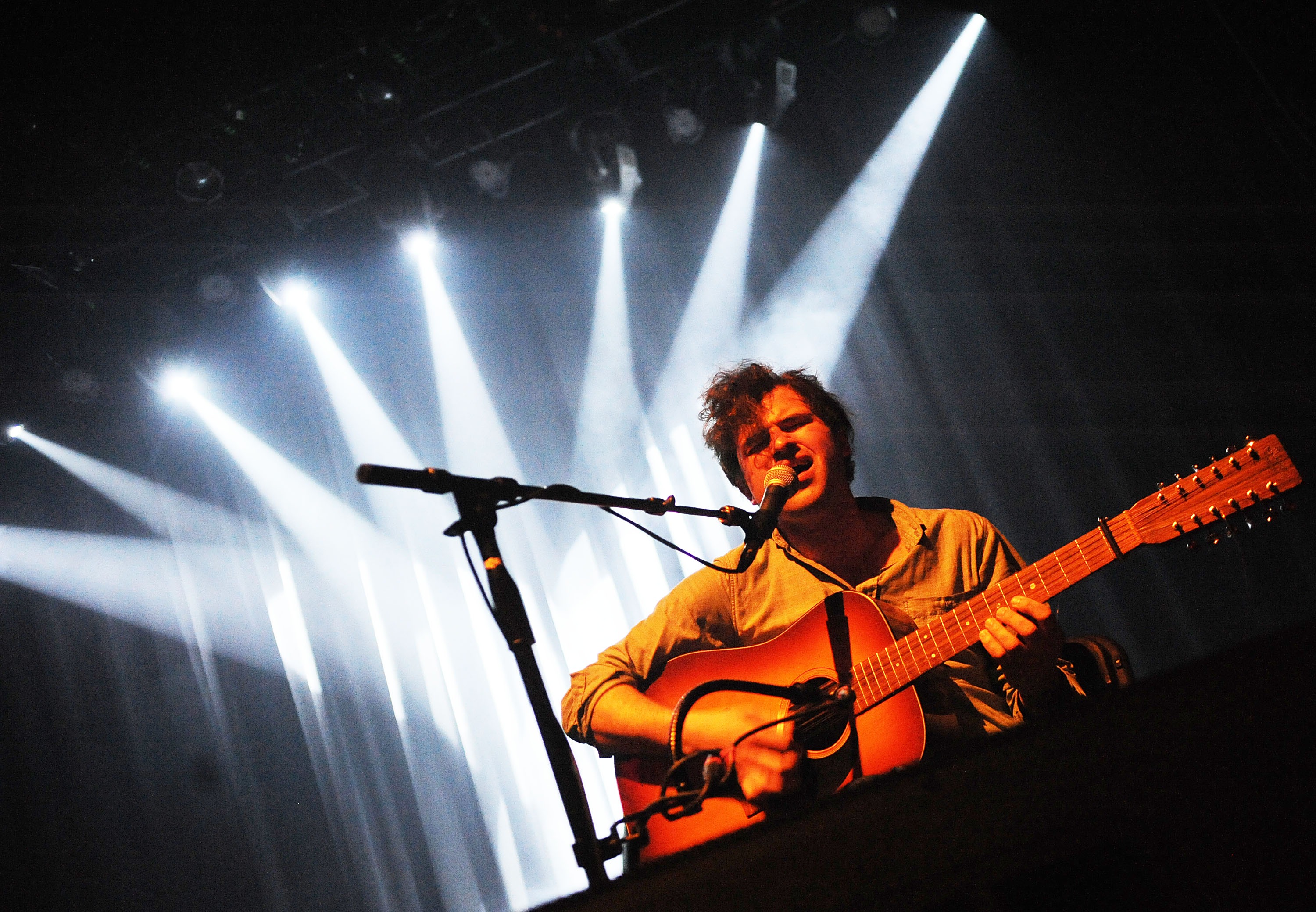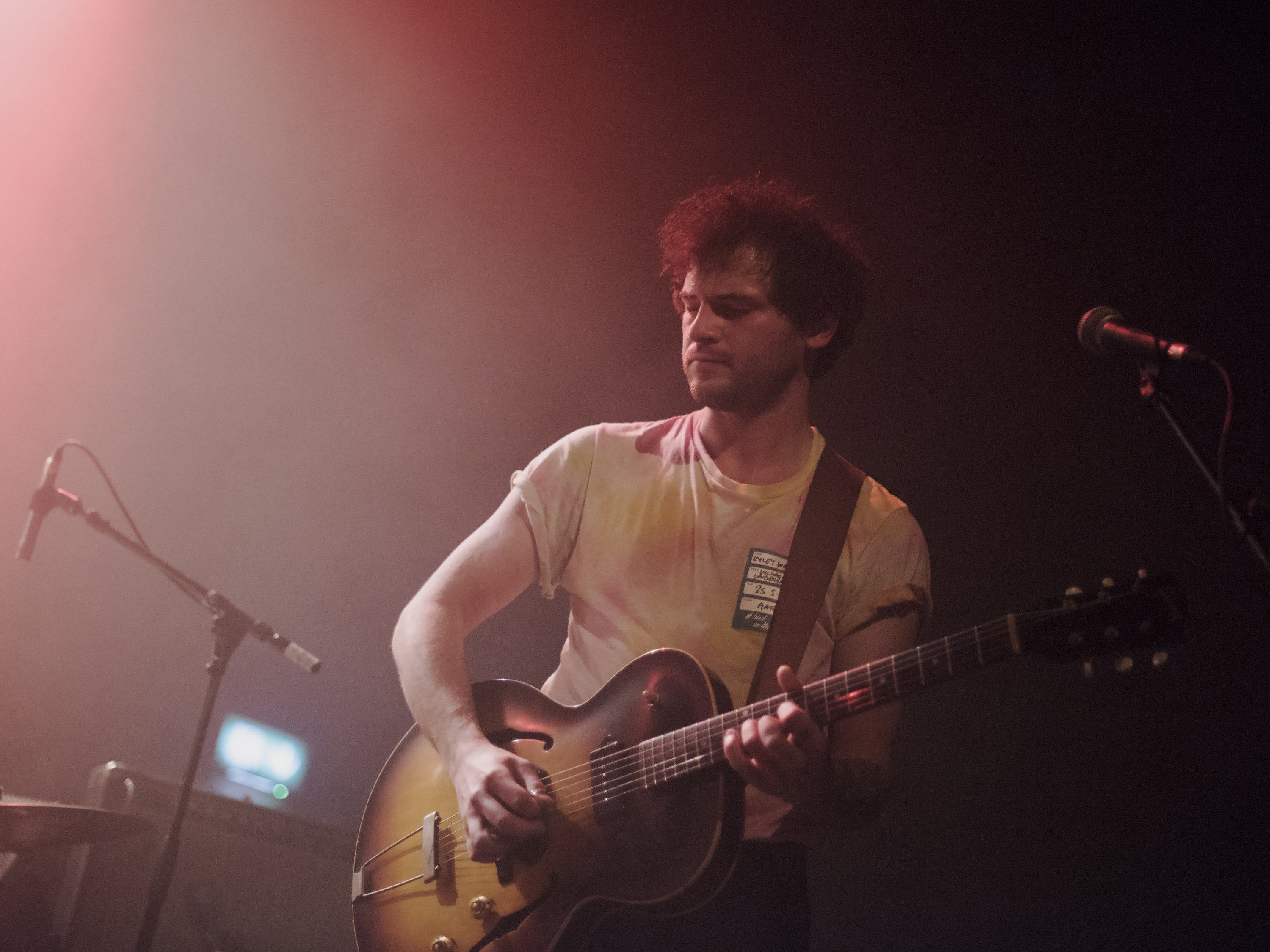When Ryley Walker checked in last week from a tour stop in Las Vegas, you could hear the sunshine in his voice. “I’m enjoying making music so much right now,” the 30-year-old guitarist enthused. “I feel like a little kid again and it’s cool. I’m turned on by the way Mickey Hart hits the drums and the way Steve Hackett has a goofy 12-string-guitar on stage. I’m full of wonder at these sort of rock gods again, you know?”
It’s exactly the sort of exuberance that Walker has become known for via his popular Twitter account, where he’s established himself as one of the funniest people in indie rock. (This is a good, and pertinent, example.) But it also alludes to a deeper and more profound truth about Walker’s life this year.
In early 2019, Walker relocated from Chicago to New York City. He had high hopes for his immersion in the local music scene as a semi-famous singer-songwriter and one of the leading lights of the so-called “indie jam” scene. And he swiftly made his presence felt, playing an incredible set of improvised music in March at Brooklyn’s Union Pool with fellow guitarist Steve Gunn and drummer Ryan Jewell that Walker later released as an excellent live LP, Flops In New York, on his own label, Husky Pants Records. (You can also stream the performance for free at nyctaper.com.)
The freedom and invention of Flops In New York — which deserves to be mentioned among 2019’s very best albums — belies the personal hell that Walker was enduring at the time. Mere weeks after playing that show, he checked himself into a drug and alcohol rehabilitation facility in Nashville. The previous month, while on tour with the legendary folk-rock guitarist Richard Thompson, he tried to kill himself in a New Mexico hotel room.
It’s a scenario that has played out far too many times in music lately. In 2019, the great indie singer-songwriter David Berman took his own life on the eve of a tour in support of his acclaimed Purple Mountains album. Just this week, 21-year-old superstar rapper Juice WRLD died from as-yet-undetermined circumstances, though he had been candid in the past about his struggles with drug abuse.
Walker came perilously close to the brink this year, but was able to survive. I asked him how he did it.
You checked into rehab this spring. Can you tell me about what led up to your decision to get help?
Richard Thompson was so cordial and friendly, and his crew was so cordial and friendly and wonderful. It was a dream come true to be able to be on that tour. But I was all alone, driving nine hours a day. And I realized I can’t be alone on tour anymore. That kind of sends me to a dark zone.
I was just losing my mind. We were playing a lot of cities where I didn’t know anybody, so that kind of gave me incentives to just walk up to people on the street who looked out of it and be like, “Hey, where can I get drugs in this town?” I would go to some shitty house in the wrong part of town and pick up. It’s a miracle I got on stage every night somehow. And I hated music, too. That was a big bummer. In my mind, music was doing nothing for me anymore. It was just a pain in my ass. It was slowing me down.
I wanted to get fucked up more than I wanted to play music. That was rock bottom. After that tour, when I got home, I was just like, “I’m quitting music. I’m done with this shit.” It wasn’t even in a bitter way. That’s what I chose to do with my life.
Did you try to kill yourself after that tour?
No, it was right in the middle of it. I was in New Mexico and I was just having a particularly bad day. I’m diagnosed bipolar, manic-depressive and all this shit now and all those … symptoms were just coming out like crazy.
I was talking to myself in the car and just isolating and getting into terrible, cyclical, dark, dark thoughts. Really just anybody who I was talking to or in communication with at that point was really concerned. I was just taking hostages, man. Like, mental hostages. Threatened suicide, saying crazy shit, just basically constantly threatening self-harm and anybody who loves me and was in communication with me at that point knew something was going on.
At a hotel in New Mexico, I took way too many drugs and drank way too much — definitely enough where I thought I would kill myself. I tried to fucking die in a Motel 6. Then I magically woke up with a brutal hangover and I was honestly angry again. “Man, this sucks. I can’t do anything.” I drove to the next show that night and played and pretended like nothing happened. I cried a lot that fucking night.

Soon after that you flew home to New York. How did you end up in rehab?
I never had money growing up, so I’m one of those people that’s like, “Oh, I have money. Let’s spend it.” It immediately went towards drugs or closing down a bar. That’s all I did in New York for two weeks until I had a particularly lit-up night. I just completely blacked out on my own and I called every drug dealer I knew and gave them every dime I had earned on the Richard Thompson tour and I drank and used coke and dope from 10 a.m. to 4 a.m. And then I woke up, just vomiting and shaking, with alcohol and drug withdrawals.
I just felt my life going absolutely nowhere. I really didn’t like the person I saw in the mirror. That day, I’m really glad that I called a few people who work at [Walker’s former label] Secretly Canadian. They all helped me get into rehab.
I was supposed to go to Europe with Richard Thompson for all of April. My plan was to do that, and then go to rehab. But the people I contacted were like, “No, you’re canceling that tour. You’re going to rehab tomorrow. This is your one shot. We’re not going to support you financially unless you go tomorrow.” I’m glad I was given an ultimatum because I couldn’t have gone to Europe and been like, “Yeah, I’m just chilling.” I would’ve gone insane.
We’ve seen so many great musicians die from either suicide or drug and alcohol abuse. What is it about this lifestyle that puts people at risk?
Touring is fun and a blast and a joy until it’s not. That’s something people fail to realize. Touring is fun and it is a blast to play music, and making a meager, honest living out of it is what I’ve always wanted to do. But it’s all great until it’s not, man.
The idea of being away from people you love and your environment, it takes a really special type of person to be able to handle it. I include myself in this. People crack during it. Not every human brain was made to sit in a vehicle going in a direction for eight hours every single day, stopping once every three hours just to look at fucking Sour Patch Kids gummies hanging up in a gas station.
Rarely do people go, “Hey, address the situation going on in your brain.” It’s just, “Hey, stick it out! Sleep on couches! Be cool with drinking 30 beers a day.” I wish somebody at the start had been like, “Just take care of yourself.” Because excess has always been part of the music scene for me.
How has being sober affected your approach to life on the road?
I have a routine now because before tour was about no routine. Tour was about, “Hey, let’s see what trouble we can get in. Let’s let our feet do the walking instead of our brains doing the thinking.” I was always led by vibe. Now, the vibe is: I’m going to do this for my own benefit for once, instead of trying to impress anybody else by how much cocaine I can shove up my nose in one evening.
I just go to a meeting every day. I used to look for crazy people like me in dive bars and now I look for crazy people like me in recovery meetings.

But you must be surrounded by drugs and alcohol constantly. You play most of your gigs in bars and clubs. How do you deal with being in that environment now?
I have a lot of accountability right now. I have a lot of eyes on me. I leave immediately after the show, after I’m done playing. I don’t hang out anymore and that’s not to be an asshole. That’s me just saying, “Hey, I need to go to bed now.” I play and I leave and I call my sponsor. That’s something I probably need to do for a long time.
I think there’s a lot of people kind of more out about their recovery now, you know? When I meet musicians on the road, I’m like, “Hey, I’m also in recovery.” It’s a great network to have. My sponsor tells me, “Oh hey, when you go to St. Louis, I know this musician. They’re going to come to your show. They’re also in recovery.”
I used to have networks of cocaine dealers. Now I have networks of people who care about me and want to help and it’s very inspiring. I try to give that back as much as I can. I listen to people all the time if they want to talk about these things. I only have eight months sober right now but to somebody with eight days, that’s pretty big. Somebody with ten months sober is big to me. It’s really great to have this new touring network that I never thought I’d be a part of. There’s a total sober community built around it.
What are you looking forward to in 2020?
Well, my long terms are just stay sober and keep going to meetings and listen to whatever my sponsor says I need to do. The short term is I have a bunch of great new songs that I’m really proud of and more than ever, I have so much time on my hands right now. So, I’m going to take my sweet, sweet, cherished, valuable time and this gift I’ve been given of life, and I’m just going to hopefully let the music come from living a really good, happy life.
I would encourage anybody who needs help to ask for it. It’s out there. Everybody’s case is completely different, but there’s a lot of people and a lot of musicians especially who are down to listen and who understand what the fuck is going on with you. Because what the fuck was going on with me is that I wanted to die and I couldn’t stop using. Now, I’m pretty stoked to live. And I’ve stopped using drugs and it’s helped me become a much better musician.







